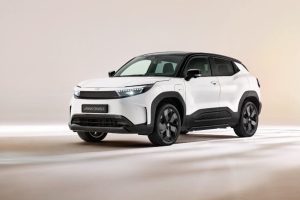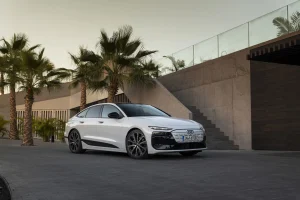Rimac Technology unveiled its groundbreaking 100kWh solid-state battery at this year’s Munich motor show, capable of charging from 10% to 80% in just 6.5 minutes when connected to a fast charger.
The Croatian tech company developed the ‘Next-Gen’ battery with Taiwanese specialists ProLogium and Mitsubishi Chemical Group. The battery pack delivers 260 Watt-hours per kilogram energy density and will debut in Q4 2027.
Rimac Technology – the engineering division behind the all-electric Concept One and Nevera hypercars – says its solid-state solution will be lighter, safer, and more energy-dense than current battery technology.
The company’s 46XX Gen2 NMC cells can be swapped with existing hardware. This means they can be modified to fit different vehicle requirements.
Rimac says the new battery’s cell design and layout allow for more efficient packaging and cooling systems.
Second Battery Variant Arrives Earlier
The company also introduced its ‘Evo’ battery at Munich. This version arrives by mid-2026 but offers different performance characteristics.
The Evo maintains 100kWh capacity but delivers 214 Wh/kg energy density. Charging from 10-80% takes 16 minutes with fast charging.
Rimac hasn’t released range estimates for either the Next-Gen or Evo batteries.
New E-Axle Technology
Rimac Technology revealed its Sinteg 300 and 550 e-axles during the Munich showcase. These components target performance vehicles from hot-hatches to SUVs.
The e-axles could appear in high-performance models from major manufacturers. Rimac currently supplies components to Aston Martin, Porsche, BMW and Ceer Motors – Saudi Arabia’s first automaker.
The company may also provide in-wheel motors for the rumored 400bhp Volkswagen ID Polo R, if that project reaches production.
Both Sinteg axles use Rimac’s Scalable Powertrain Platform. The 300 produces 204bhp while the 550 delivers just under 490bhp.
The company introduced next-generation ECUs that support Software Defined Vehicle architecture. These control units receive over-the-air updates and manage torque vectoring, power delivery, and battery systems.
When combined with the e-axles and solid-state batteries, the smart ECUs help reduce vehicle weight and boost efficiency through sensor-driven optimization.
“What we’re showcasing [at IAA] represents the convergence of breakthrough innovation and production readiness,” said Rimac Technology COO Nurdin Pitarević. “These aren’t simply concept technologies; they’ve been developed to be production-ready solutions that will power hundreds of thousands of vehicles in the coming years.”
The announcements position Rimac Technology as a key supplier for the next generation of high-performance electric vehicles, with production timelines extending through 2027.





